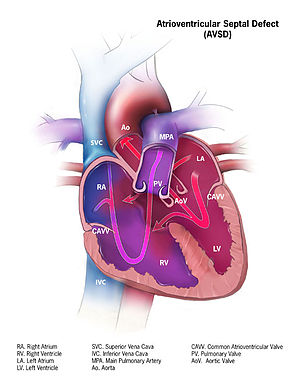
Atrioventricular canal defect

Atrioventricular septal defect (AVSD) or atrioventricular canal defect (AVCD), also known as 'common atrioventricular canal' (CAVC) or 'endocardial cushion defect' (ECD), is characterized by a deficiency of the atrioventricular septum of the heart. It is caused by an abnormal or inadequate fusion of the superior and inferior endocardial cushions with the mid portion of the atrial septum and the muscular portion of the ventricular septum. Atrioventricular septal defect (AVSD) or atrioventricular canal defect (AVCD), also known as 'common atrioventricular canal' (CAVC) or 'endocardial cushion defect' (ECD), is characterized by a deficiency of the atrioventricular septum of the heart. It is caused by an abnormal or inadequate fusion of the superior and inferior endocardial cushions with the mid portion of the atrial septum and the muscular portion of the ventricular septum. Symptoms include difficulty breathing (dyspnoea) and bluish discoloration on skin and lips (cyanosis). A newborn baby will show signs of heart failure such as edema, fatigue, wheezing, sweating and irregular heartbeat. When there are holes in the septum that divide the four chambers of the heart the oxygen-rich blood and oxygen-poor blood mix this creates more stress on the heart to pump blood to where oxygen is needed. As a result, you get enlargement of the heart, heart failure (being unable to adequately supply body with needed oxygen, pulmonary hypertension, and pneumonia. The development of pulmonary hypertension is very serious. And this because the left ventricle is weakened due to its overuse. When this happens, the pressure backs up into the pulmonary veins and the lungs. This type of damage is irreversible which is why immediate treatment is recommended after diagnosis. Down syndrome is often associated with AVCD. Other risk factors include: having a parent with a congenital heart defect, alcohol use while pregnant, uncontrolled diabetes treatment during pregnancy and some medications during pregnancy. This type of congenital heart defect is associated with patients with Down syndrome (trisomy 21) or heterotaxy syndromes. 45% of children with Down syndrome have congenital heart disease. Of these, 35–40% have AV septal defects. Similarly, one-third of all children born with AVSDs also have Down syndrome. A study also showed that there is also an increased risk of atrioventricular canal in patients who suffer from Noonan syndrome. The pattern seen in those patients with Noonan syndrome differ from those patients who have Down syndrome in that 'partial' AVCD is more prevalent in those who suffer from NS, where as those who suffer from down syndrome show a prevalence of the 'complete' form of AVCD.
